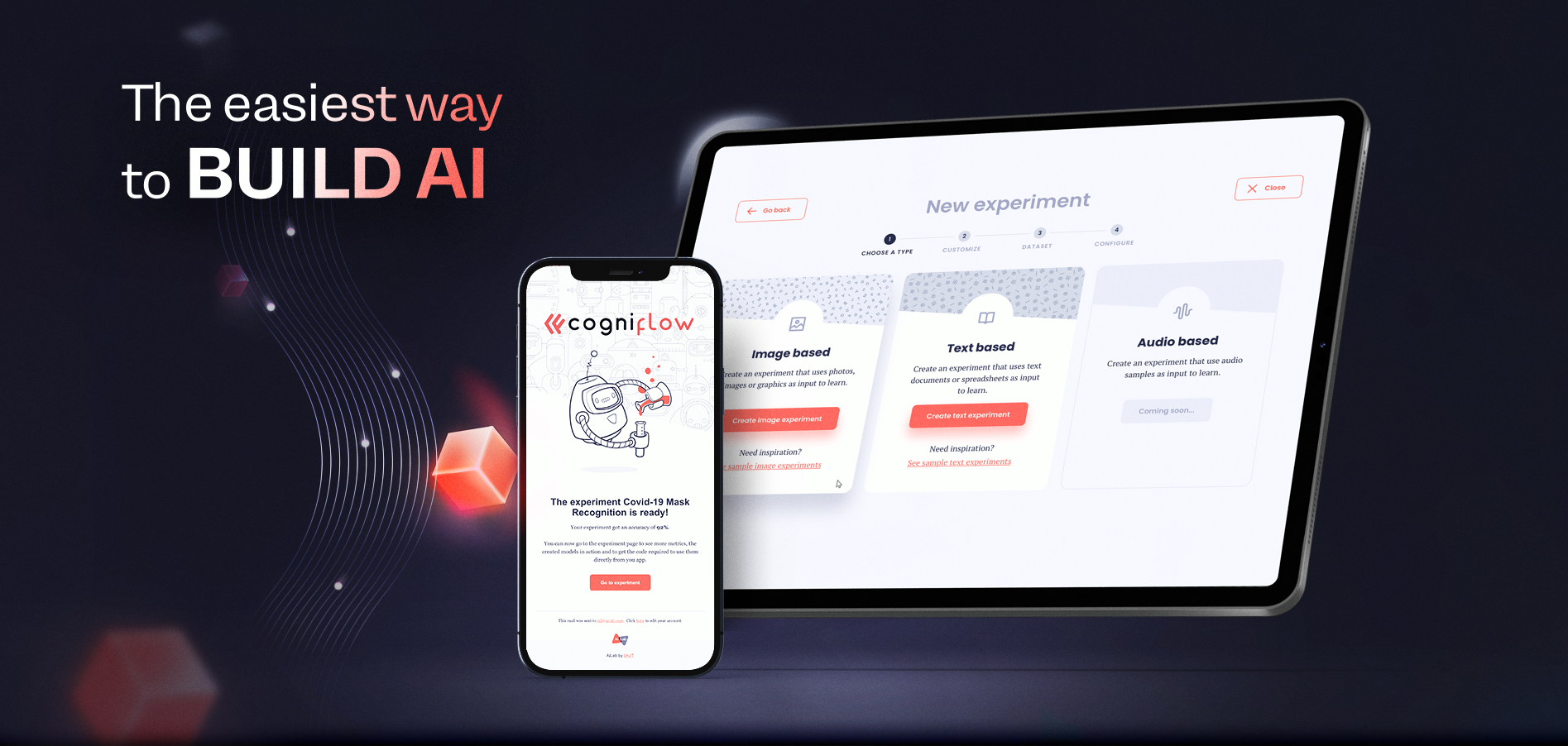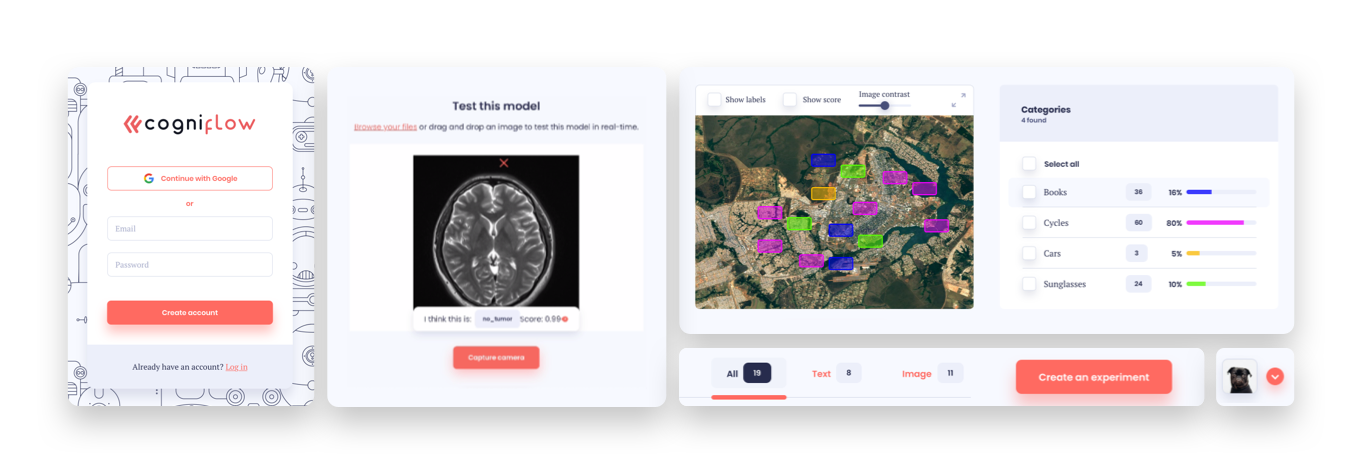
From hackathon idea to successful no-code AI platform
ABOUT
Promoting innovation at every scale
Cogniflow went from a unique idea to a viable digital platform in an impressively short amount of time. It owes its origin to a supportive atmosphere in which innovation and creativity are encouraged and actively facilitated. It owes its success to the hard work and dedication of the team who brought the platform to life.
Today we’re going to take a look at the Cogniflow journey – how this hackathon idea evolved into a successful no-code artificial intelligence solution.
Cogniflow was born out of a need for a simple, easy-to-use solution to help businesses implement AI without needing to delve into code.
AI is a driver of modern business solutions. It’s used across customer service, human resources, product and marketing, and more. Cogniflow allows users to build their own AI models, training them to suit their specific pain points. Through its use, businesses are able to create seamless customer experiences and automate otherwise tedious processes.
Cogniflow is the brainchild of Waldemar Lopez, a machine learning engineer at Uruit. Here at Uruit, we pride ourselves on our dedication to innovation. With over 100 product enthusiasts under our roof, we encourage each and every one of them to reach for the stars, generating ground-breaking ideas that push the boundaries of technology.
Lopez’s idea — a solution to integrate machine learning functionality into mobile and web apps — wasn’t the first of its kind. There are a number of products on the market aimed at integrating AI into business practices. However, the complexity with which these products operated put a real limitation on how businesses could interact with them. Lopez sought to close this gap – making AI accessible for those without an engineering degree.
This vision saw Lopez win the Uruit Innovation Contest of July 2020. His idea was sound, but could it become a viable product?

The challenge
Democratizing access to AI
Cogniflow didn’t happen overnight. It required dedication and planning to take Lopez’s idea and forge it into a solid product.
The challenge? To build a platform that would facilitate the process of adding machine learning solutions to digital products such as mobile and web applications, with a focus on ease of use and accessibility.
It started, as any project does, with the people.
- Decide where to start
The Cogniflow team started by building the product strategy & vision, to kick off the project with a clear idea of what problem they were solving, and how to navigate the later steps of building a platform.
- Conduct solid research
Through benchmarking existing products on the market, the Cogniflow team determined their competition lacked two things:
- Ease of use
- The ability to contemplate various data sources
This gave them direction – a gap in the market that needed to be filled.
- Turn ideas into a product
Taking direction from their target audience’s pain points, the Cogniflow team was able to build the first iteration of what was to become their final platform. With a focus on accessibility and UX, their demo product proved the viability of their initial idea.
- Validate until ready
The Cogniflow platform went through a number of variations. As product testing proceeded, the team detected multiple improvements that could be made to what would become the end product.
TESTING THE SOLUTION
Bringing the project to the real world
The Cogniflow platform had found its feet, but it was by no means ready for market. Before the team could set it loose, it had to be tested with a wider swath of people. Enter the hackathon.
The team invited everyone from Uruit, both technical personnel and not, to present project ideas that involved artificial intelligence features. These ideas were to be built in under two days using the Cogniflow platform.
The Uruit teams brought their A-game, presenting four projects that used Cogniflow for pictures, audio, and written text databases. Each one was built with no major issues and all teams achieved their goals successfully.
Cogniflow was a proven success, closing the gap between AI implementation and non-technical users. This was the proof of the Cogniflow platform’s viability as a product, but the market still needed to be tested. This involved:
- Interviewing potential clients
The Cogniflow team dedicated hours to getting to know their target market. They learned their needs, their pain points, and determined exactly why Cogniflow would interest them. They identified the major problem in their audiences’ lives that needed addressing: productivity. If Cogniflow was to succeed it needed to make things simple and fast for its users.
- Seeking partnerships with local companies
The Cogniflow team conducted real use cases with potential customers, offering free trials to local businesses. This stage saw Cogniflow tested in the healthcare industry, being used to build a model that could recognize whether a brain scan showed evidence of a brain tumor.
- Searching for capital
Any major project needs financial backing. Cogniflow was no different. The team successfully raised pre-seed capital, conducting conversations with multiple backers.

RESULTS
Cogniflow is live
The best technical products are constantly evolving. Cogniflow must change and grow in order to remain valuable in today’s modern market.
The Cogniflow team is always seeking ways to make the platform better. This includes seeking ways to make dataset building easier. They’re also looking into ways to share models that have already been trained with Cogniflow.
The most important focus of Cogniflow is accessibility. The team wants to make it even easier for non-engineers to use the platform, offering the power of AI to people from all walks of life.
Cogniflow became a spinoff company, offering a no-code artificial intelligence solution that bridges the gap between machine learning and non-engineers. With this platform, everyday laymen are able to harness the power of artificial intelligence to help them automate processes, build stronger relationships with their customers, and more.
The Cogniflow story is one that illustrates innovation, determination, and the power of simple ideas.
ML-powered data used by Disney and HBO
Developing custom Machine Learning recognition features in the media industry
ML-powered data used by Disney and HBO
Developing custom Machine Learning recognition features in the media industry

Migrating an eLearning platform with 100K users
Redefining the process of a healthcare focused eLearning platform
Migrating an eLearning platform with 100K users
Redefining the process of a healthcare focused eLearning platform

Powering the development of a 500 Startups company
Building a Machine Learning MVP in record time
Powering the development of a 500 Startups company
Building a Machine Learning MVP in record time

Recipe for Digital Product success
How we partnered with Forks Over Knives to build a life-changing solution for its users
Recipe for Digital Product success
How we partnered with Forks Over Knives to build a life-changing solution for its users

Health mobile app shines for its performance & design
One-week Product Discovery results in MVP and product roadmap.
Health mobile app shines for its performance & design
One-week Product Discovery results in MVP and product roadmap.

Rethinking management for +800 hospitals
Updating a health system management app for an industry award winning company
Rethinking management for +800 hospitals
Updating a health system management app for an industry award winning company
